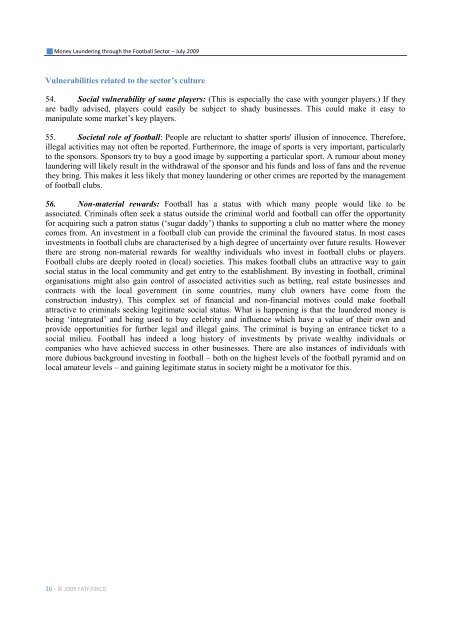Money Laundering through the Football Sector
Money Laundering through the Football Sector
Money Laundering through the Football Sector
Create successful ePaper yourself
Turn your PDF publications into a flip-book with our unique Google optimized e-Paper software.
<strong>Money</strong> <strong>Laundering</strong> <strong>through</strong> <strong>the</strong> <strong>Football</strong> <strong>Sector</strong> – July 2009<br />
Vulnerabilities related to <strong>the</strong> sector’s culture<br />
54. Social vulnerability of some players: (This is especially <strong>the</strong> case with younger players.) If <strong>the</strong>y<br />
are badly advised, players could easily be subject to shady businesses. This could make it easy to<br />
manipulate some market‟s key players.<br />
55. Societal role of football: People are reluctant to shatter sports' illusion of innocence. Therefore,<br />
illegal activities may not often be reported. Fur<strong>the</strong>rmore, <strong>the</strong> image of sports is very important, particularly<br />
to <strong>the</strong> sponsors. Sponsors try to buy a good image by supporting a particular sport. A rumour about money<br />
laundering will likely result in <strong>the</strong> withdrawal of <strong>the</strong> sponsor and his funds and loss of fans and <strong>the</strong> revenue<br />
<strong>the</strong>y bring. This makes it less likely that money laundering or o<strong>the</strong>r crimes are reported by <strong>the</strong> management<br />
of football clubs.<br />
56. Non-material rewards: <strong>Football</strong> has a status with which many people would like to be<br />
associated. Criminals often seek a status outside <strong>the</strong> criminal world and football can offer <strong>the</strong> opportunity<br />
for acquiring such a patron status („sugar daddy‟) thanks to supporting a club no matter where <strong>the</strong> money<br />
comes from. An investment in a football club can provide <strong>the</strong> criminal <strong>the</strong> favoured status. In most cases<br />
investments in football clubs are characterised by a high degree of uncertainty over future results. However<br />
<strong>the</strong>re are strong non-material rewards for wealthy individuals who invest in football clubs or players.<br />
<strong>Football</strong> clubs are deeply rooted in (local) societies. This makes football clubs an attractive way to gain<br />
social status in <strong>the</strong> local community and get entry to <strong>the</strong> establishment. By investing in football, criminal<br />
organisations might also gain control of associated activities such as betting, real estate businesses and<br />
contracts with <strong>the</strong> local government (in some countries, many club owners have come from <strong>the</strong><br />
construction industry). This complex set of financial and non-financial motives could make football<br />
attractive to criminals seeking legitimate social status. What is happening is that <strong>the</strong> laundered money is<br />
being „integrated‟ and being used to buy celebrity and influence which have a value of <strong>the</strong>ir own and<br />
provide opportunities for fur<strong>the</strong>r legal and illegal gains. The criminal is buying an entrance ticket to a<br />
social milieu. <strong>Football</strong> has indeed a long history of investments by private wealthy individuals or<br />
companies who have achieved success in o<strong>the</strong>r businesses. There are also instances of individuals with<br />
more dubious background investing in football – both on <strong>the</strong> highest levels of <strong>the</strong> football pyramid and on<br />
local amateur levels – and gaining legitimate status in society might be a motivator for this.<br />
16 - © 2009 FATF/OECD


